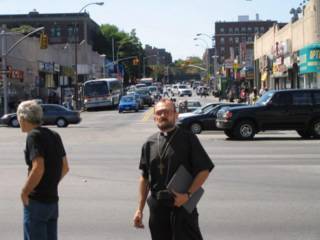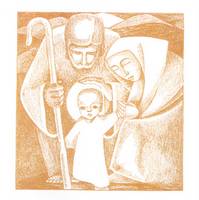HAPPY GAY LOVERS DAY!
Happy Feast of Saints Sergius & Bacchus! Today is also our "Gay Valentine's Day" as we celebrate the gay relationships of faithfully committed lovers and soul mates all over the world. It has been celebrated in the ancient Church since the third century.
(This Monday, Oct. 11th, is National Coming Out Day. If every gay clergyman came out of his closet then their sheer numbers would cause homophobic persecution in The Church to cease.)
In the scores of Christian liturgies [Same Sex Unions in Premodern Europe* by Professor John Boswell] down through the centuries that bless same sex unions, Ss. Sergius & Bacchus are invoked as the archetype, the model for same sex relationships. But it was not for their sexuality these young men were canonized. It was for their faith -- one of history's most poignant ironies, given much of the Church's unflinching campaign against gay love.
[* The holy union ceremonies discussed at length in his book were performed in Catholic and Orthodox Churches for over fourteen centuries in locations where Greek or Old Church Slavonic was spoken, which at one time was most of the Christian world. Some think these ceremonies bear strong resemblance to heterosexual marriage ceremonies, however -- it is NOT the Sacrament of Holy Matrimony. Others insist that they were most likely some kind of blood brotherhood ceremony.]
So Jonathan and David made a solemn compact because each loved the other as dearly as himself. Jonathan pledged himself afresh to David because of his love for him, for he loved him as himself. "....The Lord stand witness between us forever to the pledges we have exchanged." Then they kissed one another and shed their tears together… O Jonathan, laid low in death! I grieve for you, Jonathan my brother; dear and delightful you were to me; your love for me was wonderful, surpassing the love of women. (The Holy Bible; in the books of Samuel)
This narrative privileges love between two gay military men for their Christian faith. After their arrest, the two lovers -- attached as imperial body guards to the household of the eastern Emperor Galerius Maximianus (305-11) on the Syrian frontier -- were stripped of their arms and badges of rank and paraded through city streets (Arabissus, near Comana in Cappadocia) in women’s clothing. This abject treatment that was meant to humiliate them as officers in the Roman army. As they were paraded through the city streets, they chanted together:
"Yea , though we walk through the valley of the shadow of death, we will fear no evil Lord, because denying ungodliness and worldly lust we have put off the form of the old man and we, naked, rejoice in You, because You have clothed us with the garment of salvation. You have covered us with the robe of righteousness. You have decked us as brides with women’s gowns, and have joined us one to another for You, through our faithfulness."
They were then separated and each was tortured. Bacchus was whipped until his flesh was raw and died first on October 1st, 290 AD. (Some cite their martyrdom as 303 A.D.) His body was thrown out on to the highway, and it is said that vultures protected it from the attacks of dogs. He appeared that night to Sergius, who was beginning to lose heart. According to the early manuscripts, Bacchus told Sergius to persevere, that the delights of heaven were greater than any suffering, and that part of their reward would be to be re-united in heaven as lovers.
Sergius weeps and cries out:
"Oh, my other half, (it is from Sergius that we got that affectionate term) never will we sing together the hymns and songs we used to sing.. Unyoked from me, you have left me here on earth, lonely and disconsolate."
Then Bacchus appears to him, the biographer says, "radiantly and beautiful":
"Why do you morn and grieve, my beloved? I have been taken from you bodily, but in the bond of our love, I am with you still. Hurry now so that through your good and perfect fidelity, you may be worthy to earn me as the reward of the race. For my crown of justice is you."
At this point it becomes a very remarkable story. No other early martyr story emphasizes the love between two human beings in this way. They are martyred for confessing the Most Holy Name of Christ Jesus. Sergius kept faith and he was then tortured further before he was beheaded on October 7th, 290 AD.
The tomb of St. Sergius at Resapha become a famous shrine and was honored by great gatherings of Christians because of the frequent miracles there. Sergius and Bacchus became the heavenly protectors and official patrons of the Byzantine army -- (with the two Theodores, Demetrius, Procopius and George.) Sergius was venerated as patron of Syria. Their "acts" are preserved in Latin, Greek and Syria. In 431 AD , Bishop Alexander of Hierapolis built a magnificent church in his honor. In 434, the town of Resapha was raised to the rank of an Episcopal See and was named Sergiopolis and soon became one of the greatest pilgrimage centers of the East. Many churches in many towns bore the name of Sergius (sometimes with Bacchus) and in the seventh century, a church was dedicated to them in Rome. Parts of his relics were transferred to Venice, where these saints were patrons of the ancient cathedral. The saints are particularly popular throughout the Mediterranean land, in Latin America, and among the Slavs. Arab nomads continue to revere them as their special patron saints.
PS: Today is also the Feast of The Holy Rosary which commemorates the victorious naval Battle of Naupactos by European Christians over the Islamic Ottaman's (Turkish) fleet at Lepanto in 1571 AD. More about this related Feast above...































































0 Comments:
Post a Comment
<< Home